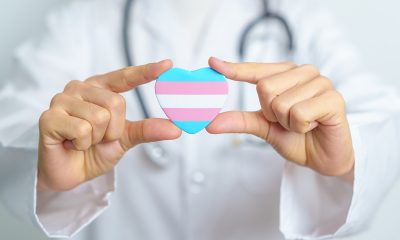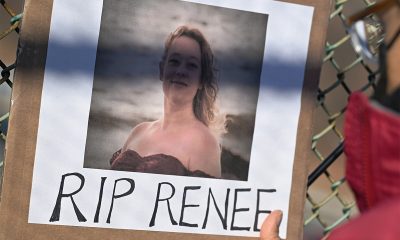News
European LGBT rights advocates gather in Croatia
Uzra Zeya of U.S. State Department addressed ILGA-Europe conference participants
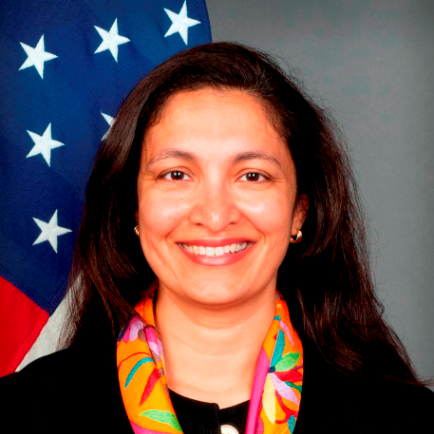
Croatian President Ivo Jospović on Thursday welcomed those who attended the gathering in Zagreb, the country’s capital, in a video message.
“I take this opportunity to congratulate you on your courage and perseverance in the struggle for your right to be different, your right to be public and visible,” Jospović said.
Uzra Zeya, acting assistant secretary of the Bureau of Democracy, Human Rights and Labor at the U.S. State Department joined European Union Special Representative for Human Rights Stavros Lambrinidis, Portuguese LGBT rights advocate Miguel Vale de Almeida and other officials who spoke during the conference. Denis Dison of the Gay and Lesbian Victory Fund, Russian LGBT rights advocates Igor Kochetkov and Polina Andrianova, Neil Grungras of the Organization for Refugee Asylum and Migration and Hilde Vossen of the European Bisexual Network are among the activists who attended the gathering.
“The exchange of experiences and policy development is highly beneficial to us in Europe, as the European societies as well as the national laws differ widely across the continent,” Søren Laursen of LGBT Denmark, a Danish advocacy group, told the Washington Blade. “The activists fighting the course need to understand the differences and learn the different political realities to be able to formulate policies. An ILGA-Europe conference is a big sharing experience.”
The ILGA-Europe conference took place less roughly five months after same-sex couples began to marry in France.
Gays and lesbians can also legally tie the knot in Portugal, Spain, Iceland, the Netherlands, Belgium, Norway, Sweden and Denmark.
Same-sex couples will be able to legally marry in England and Wales in the spring, while Scottish lawmakers have begun to debate their own gay marriage measure. Irish voters next year will consider a proposed constitutional amendment that would extend marriage rights to same-sex couples in the country.
Maltese parliamentarians earlier this month began to debate a measure that would allow gays and lesbians to enter into civil unions. A Croatian parliamentary commission on Thursday approved a December referendum on whether to amend the country’s constitution to ban same-sex marriage.
The upper house of the Dutch Parliament later this fall is expected to vote on a measure that would allow trans people to petition a judge to change their gender on their birth certificates, passports and other official documents without undergoing sterilization and sex-reassignment surgery.
Activists continue to combat homophobia, transphobia
Anti-LGBT discrimination and violence in Europe remains a serious concern in spite of these legislative advances.
Nearly half of the respondents who took part in a survey the European Union Agency for Human Rights conducted in E.U. countries in 2012 said they experienced anti-gay discrimination or harassment. A quarter of respondents said they experienced violence or were threatened during the past year — this figure increases to 35 percent among trans people who took part in the survey.
The annual ILGA-Europe conference took place less than a week after police in Montenegro clashed with protesters who sought to disrupt a Pride march in Podgorica, the country’s capital.
Hundreds of Serbian LGBT rights advocates late last month criticized their government’s decision to ban a Pride march in Belgrade because of what officials described as the threat of violence from anti-gay extremists.
The European Union and the governments of the Netherlands and other member countries have also repeatedly criticized Russia over its LGBT rights record that includes a law that bans gay propaganda to minors.
“Laws that validate discrimination, as we have seen in Russia, can lead to an increase in violence and harassment,” Zeya said during her speech at the ILGA-Europe conference. “This is particularly true when authorities don’t act to protect all of their citizens and when they fail to investigate and prosecute crimes committed by or against particular groups.”
Jospović did not specifically reference Russia in his remarks, but he did stress human rights “imply the right of every human being to achieve his or her potential in that which he or she is.”
“This includes the right to freely express one’s sexual orientation and gender identity without the threat of anyone being humiliated, insulted and subjugated to violence as a result or to be excluded from social and public life,” the Croatian president said.
Saša Gavrić, executive director of the Sarajevo Open Centre, an LGBT rights group in the Bosnian capital, co-presented a workshop on responding to hate crimes in the country.
“We believe [in] high level events, like this one,” Gavrić told the Blade. “The grassroots work like our work in Sarajevo will together contribute to achieving full equality of LGBT persons in Europe.”
Members of Famiglie Arcobaleno, an Italian group that advocates on behalf of LGBT parents and those who want to have children, also presented at the ILGA-Europe conference.
Luca Possenti of the Famiglie Arcobaleno Board of Directors noted to the Blade his organization continues to work with schools and other institutions to recognize same-sex couples and their families, even though gays and lesbians remain unable to marry or adopt children in Italy. He stressed working with teachers in particular to become more LGBT-friendly is “fundamental throughout Europe” because prejudice, homophobia and transphobia remain pervasive in many European countries.
Transgender Europe, a continent-wide trans advocacy organization with more than 70 affiliates in 35 countries, also participated in the conference.
The group notes 71 anti-trans murders have been reported in Europe over the last five years. Two dozen European countries still require trans people to become sterilized before they can legally change their gender.
“The ILGA-Europe conference is one of the regular opportunities to meet, work and network in one place with many relevant stakeholders in the field of LGBTI work,” Transgender Europe Secretary Alecs Recher told the Blade. “ILGA-Europe strengthens trans representation in this meeting space and supports greater cohesion of the joint struggle for human rights on grounds of sexual orientation and gender identity.”
Virginia
Va. Senate committee approves resolution to repeal marriage amendment
Outgoing state Sen. Adam Ebbin introduced SJ3

The Virginia Senate Privileges and Elections Committee on Wednesday by a 10-4 vote margin approved a resolution that seeks to repeal a state constitutional amendment that defines marriage as between a man and a woman.
Outgoing state Sen. Adam Ebbin (D-Alexandria) introduced SJ3.
Same-sex couples have been able to legally marry in Virginia since 2014. Republican Gov. Glenn Youngkin in 2024 signed a bill that codified marriage equality in state law.
A resolution that seeks to repeal the Marshall-Newman Amendment passed in the General Assembly in 2021. The resolution passed again in 2025.
Two successive legislatures must approve the resolution before it can go to the ballot. Democrats in the Virginia House of Delegates have said the resolution’s passage is among their 2026 legislative priorities.
Iran
Grenell: ‘Real hope’ for gay rights in Iran as result of nationwide protests
Former ambassador to Germany claimed he has sneaked ‘gays and lesbians out of’ country

Richard Grenell, the presidential envoy for special missions of the United States, said on X on Tuesday that he has helped “sneak gays and lesbians out of Iran” and is seeing a change in attitudes in the country.
The post, which now has more than 25,000 likes since its uploading, claims that attitudes toward gays and lesbians are shifting amid massive economic protests across the country.
“For the first time EVER, someone has said ‘I want to wait just a bit,” the former U.S. ambassador to Germany wrote. “There is real hope coming from the inside. I don’t think you can stop this now.”
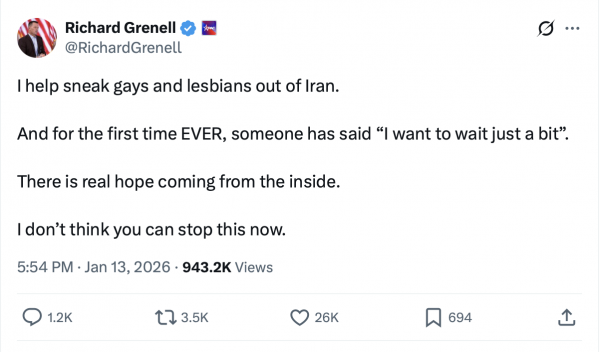
Grenell has been a longtime supporter of the president.
“Richard Grenell is a fabulous person, A STAR,” Trump posted on Truth Social days before his official appointment to the ambassador role. “He will be someplace, high up! DJT”
Iran, which is experiencing demonstrations across all 31 provinces of the country — including in Tehran, the capital — started as a result of a financial crisis causing the collapse of its national currency. Time magazine credits this uprising after the U.N. re-imposed sanctions in September over the country’s pursuit of nuclear weapons.
As basic necessities like bread, rice, meat, and medical supplies become increasingly unaffordable to the majority of the more than 90 million people living there, citizens took to the streets to push back against Iran’s theocratic regime.
Grenell, who was made president and executive director of the John F. Kennedy Center for the Performing Arts last year by Trump, believes that people in the majority Shiite Muslim country are also beginning to protest human rights abuses.
Iran is among only a handful of countries in which consensual same-sex sexual relations remain punishable by death, according to the Death Penalty Information Center.
Virginia
Mark Levine loses race to succeed Adam Ebbin in ‘firehouse’ Democratic primary
State Del. Elizabeth Bennett-Parker won with 70.6 percent of vote
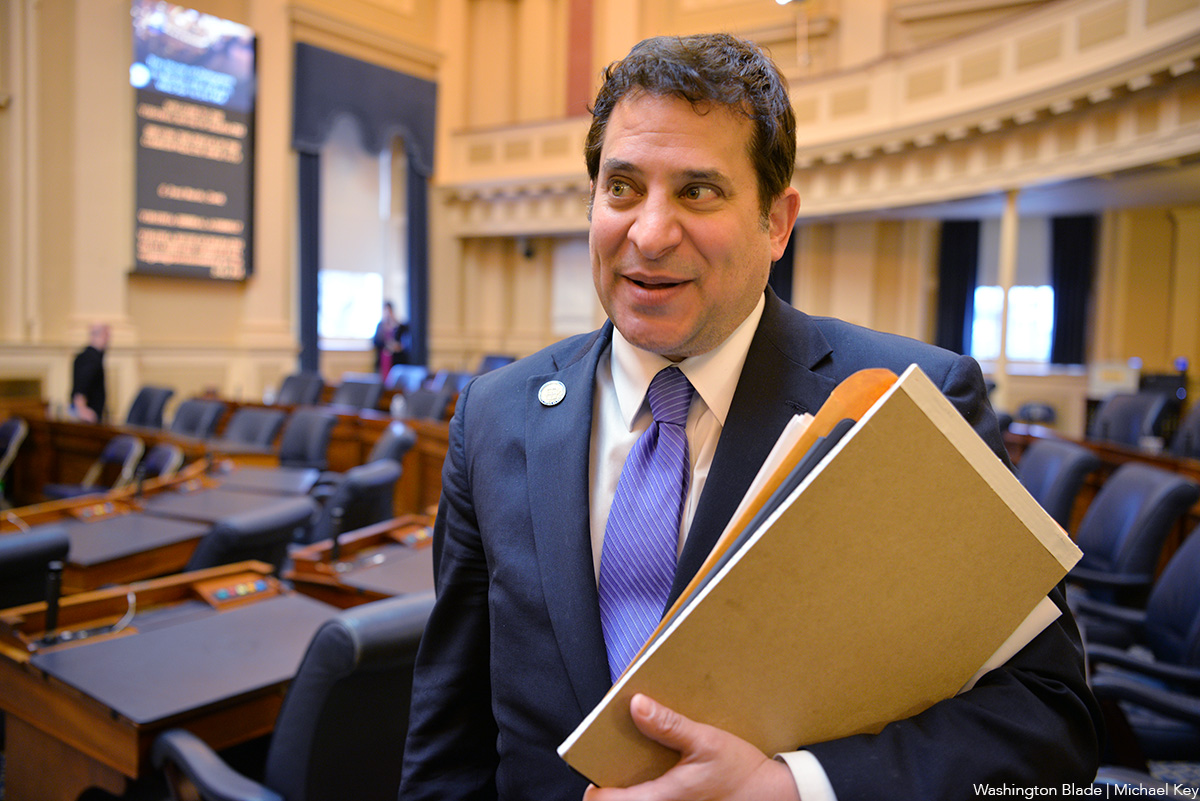
Gay former Virginia House of Delegates member Mark Levine (D-Alexandria) lost his race to become the Democratic nominee to replace gay state Sen. Adam Ebbin (D-Alexandria) in a Jan. 13 “firehouse” Democratic primary.
Levine finished in second place in the hastily called primary, receiving 807 votes or 17.4 percent. The winner in the four-candidate race, state Del. Elizabeth Bennett-Parker, who was endorsed by both Ebbin and Gov.-elect Abigail Spanberger received 3,281 votes or 70.6 percent.
Ebbin, whose 39th Senate District includes Alexandria and parts of Arlington and Fairfax Counties, announced on Jan. 7 that he was resigning effective Feb. 18, to take a job in the Spanberger administration as senior advisor at the Virginia Cannabis Control Authority.
Results of the Jan. 13 primary, which was called by Democratic Party leaders in Alexandria, Arlington, and Fairfax, show that candidates Charles Sumpter, a World Wildlife Fund director, finished in third place with 321 voters or 6.9 percent; and Amy Jackson, the former Alexandria vice mayor, finished in fourth place with 238 votes or 5.1 percent.
Bennett-Parker, who LGBTQ community advocates consider a committed LGBTQ ally, will now compete as the Democratic nominee in a Feb. 10 special election in which registered voters in the 39th District of all political parties and independents will select Ebbin’s replacement in the state senate.
The Alexandria publication ALX Now reports that local realtor Julie Robben Linebery has been selected by the Alexandria Republican City Committee to be the GOP candidate to compete in the Jan. 10 special election. According to ALX Now, Lineberry was the only application to run in a now cancelled special party caucus type event initially called to select the GOP nominees.
It couldn’t immediately be determined if an independent or other party candidate planned to run in the special election.
Bennett-Parker is considered the strong favorite to win the Feb. 10 special election in the heavily Democratic 39th District, where Democrat Ebbin has served as senator since 2012.



